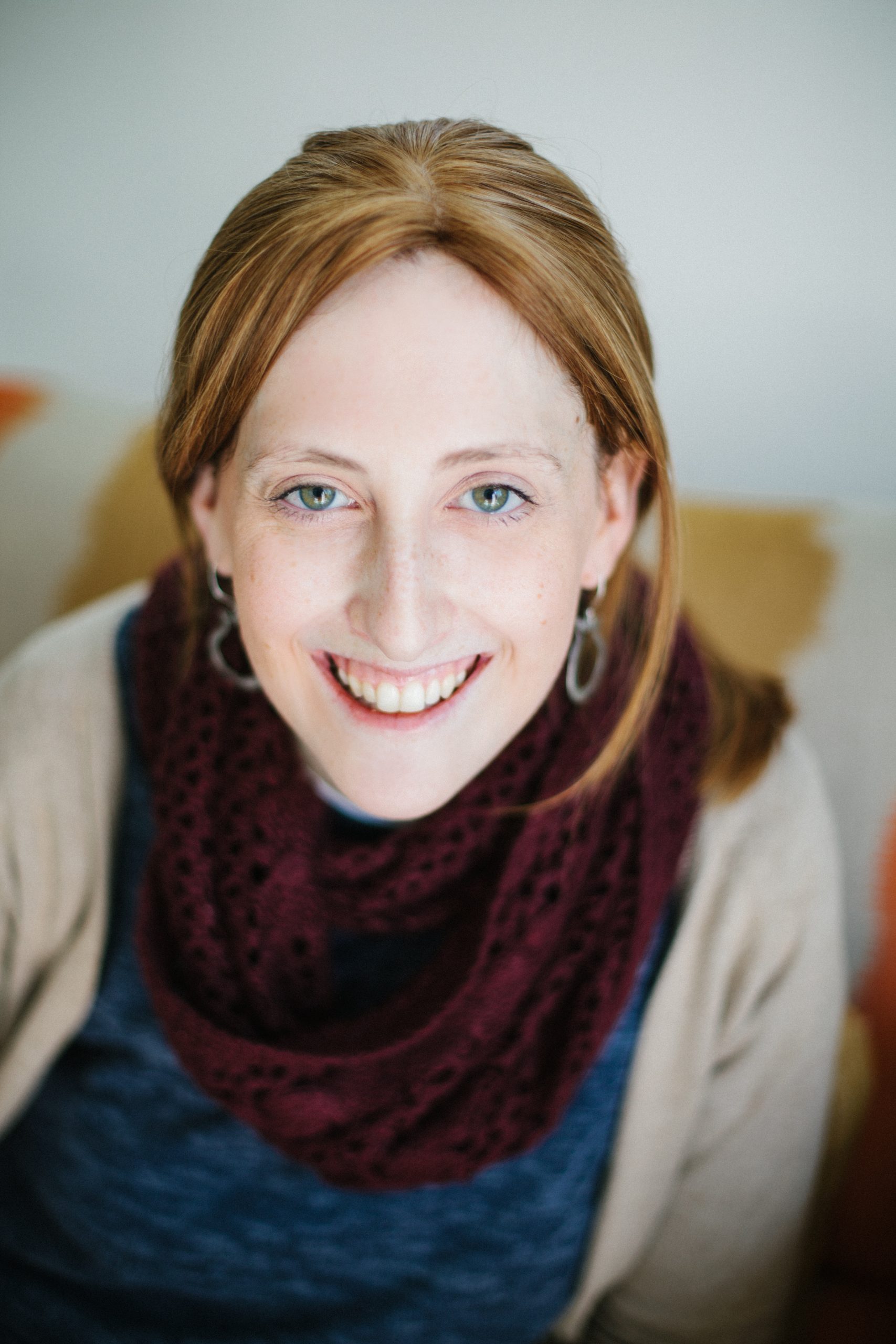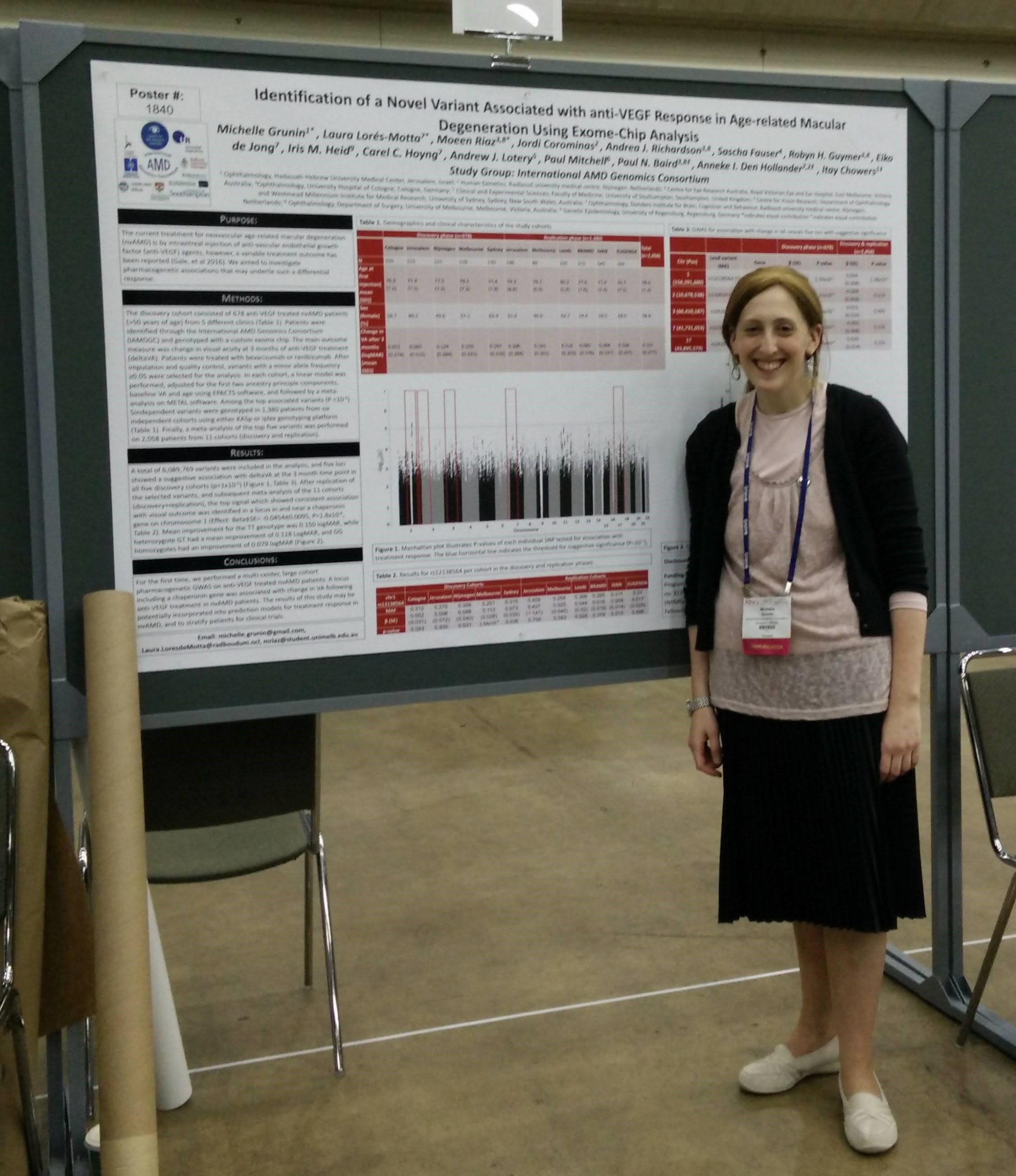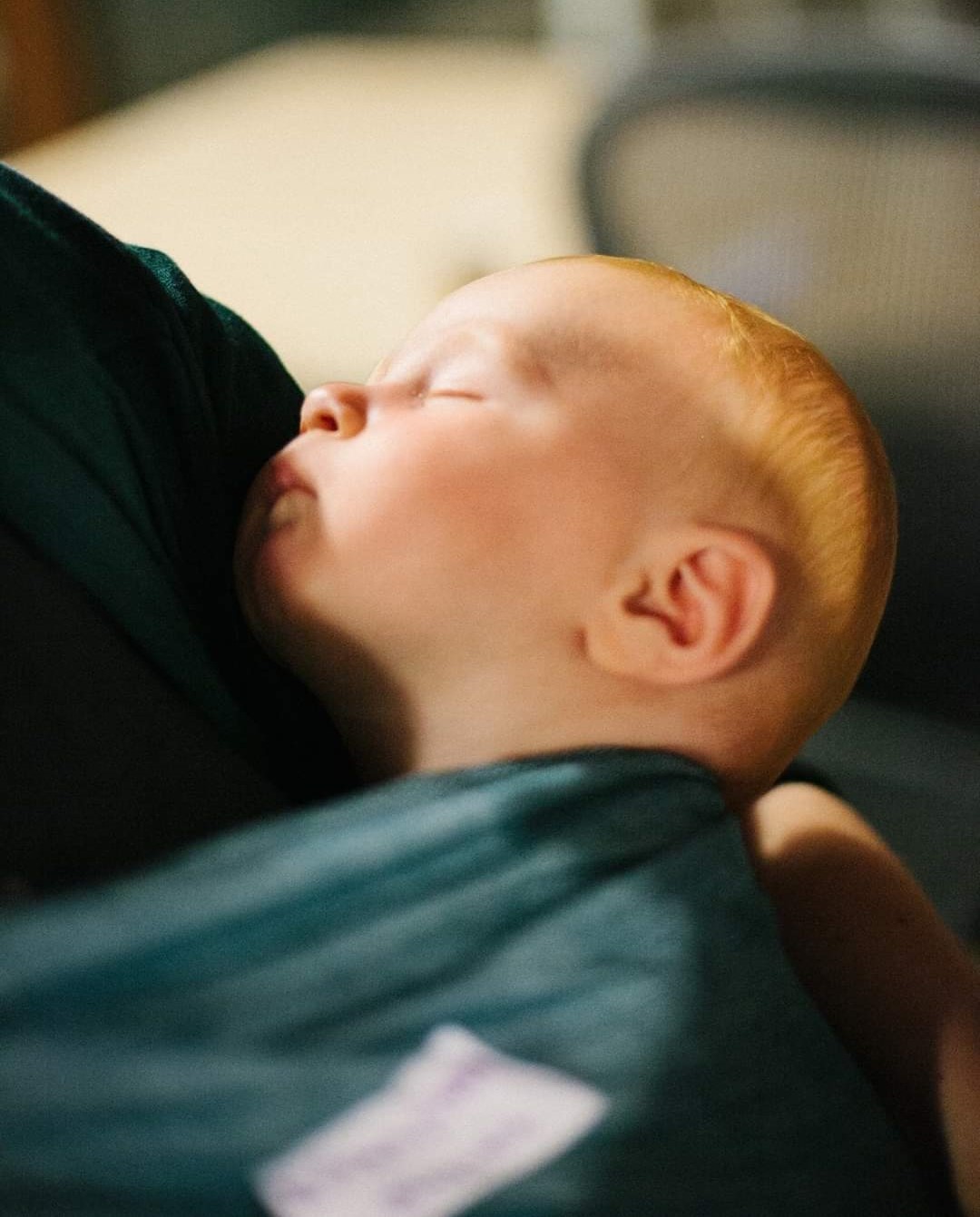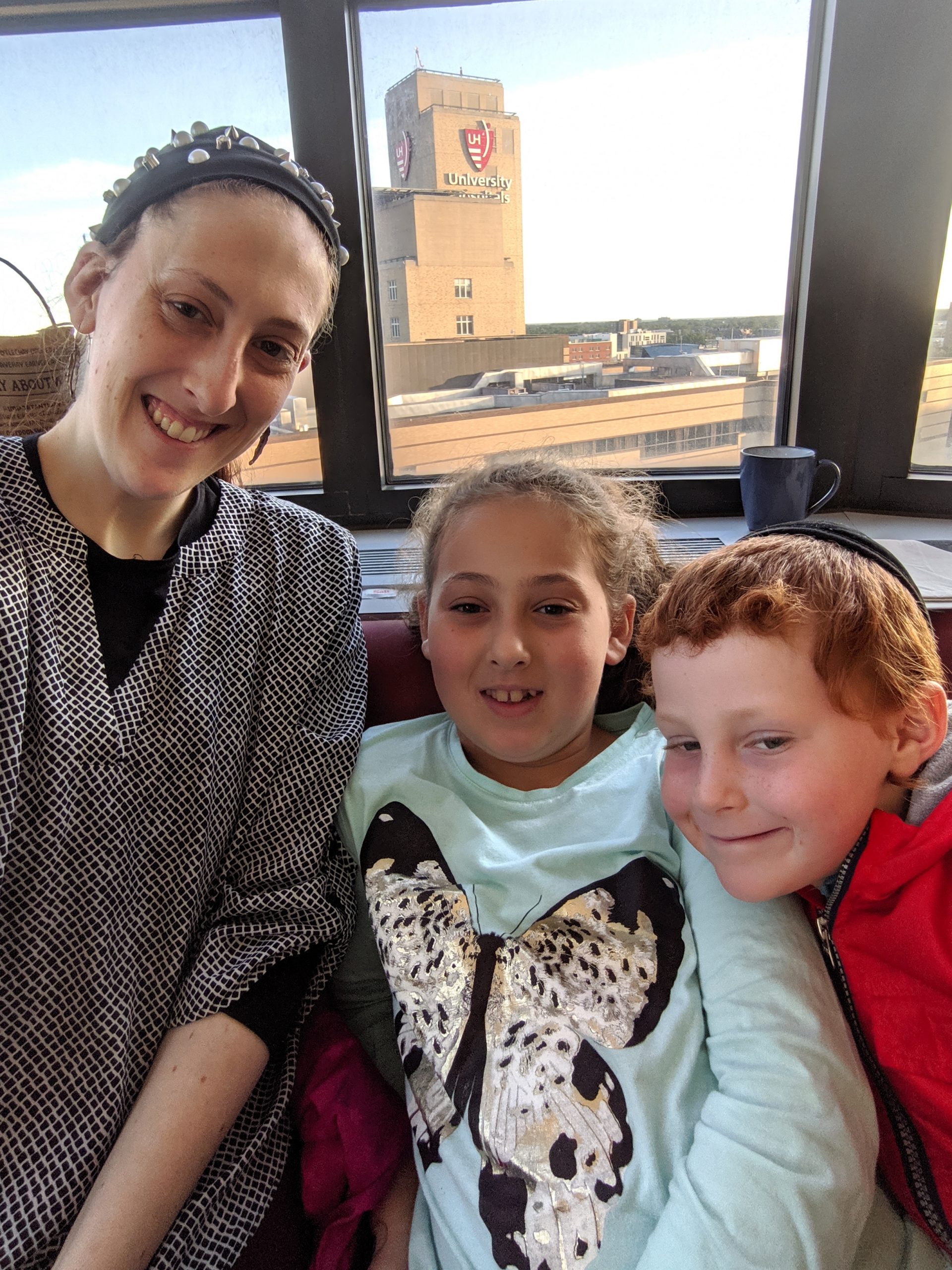Don’t Give Up
An Interview with Dr. Michelle Grunin
By Penina Taylor
Professionally she’s Michelle Grunin, but to those that know her, both in real life and online, she’s Efrat. Though for many years when other Orthodox women would ask her what she did for a living, Michelle would answer that she “worked in a lab”, the truth is that Dr. Grunin does so much more than that. No, technically, it wasn’t a lie, but it wasn’t entirely the truth, either. This is the reality of highly educated professional women who move in circles that would be considered more “to the right” on the Jewish religious scale, or at least until recently. Things are changing, and the changes are good.
Michelle grew up in a religious home but with a very religiously diverse family. Her parents became baalei teshuva (those who become religious after having not been) when her three brothers were older, but before she was born. Practically this means that regardless of how Michelle chooses to identify herself, she’s very accepting of Jews (and non-Jews for that matter) of all different affiliations.
She grew up in Chicago (first the suburbs, then the city) in a family with deep roots in Chicago. Because of her parents’ love for Israel, and their desire to ultimately retire there, Michelle spent a lot of time visiting Israel growing up. Like many Orthodox girls, after high school, Michelle spent a year at seminary in Israel, and then returned to the US for college. But immediately after graduation she made Aliyah. About five years later her parents retired and came to Israel as well.
In college, Michelle studied pre-med and graduated with a degree in biology from Touro College. While a student at Touro, she helped found the science journal at the college that publishes peer-reviewed work from students there. Michelle remains a “co-emeritus” editor of the journal which is now in its 15th year of publication.
Michelle went into pre-med with the goal of continuing on to med school (to become a medical doctor), but while at Touro, the head of the biology
department, Dr. Robert Bressler, suggested that she look into research, that perhaps she would enjoy it. She told him that she was headed to med school, and she wasn’t really interested in research. But Dr. Bressler set up an internship for Michelle at SUNY where she worked with smallpox and vaccinia virus (the predecessor of smallpox and used to create the smallpox vaccine). Much to her surprise, she really liked the work. So, she began to consider the possibility of heading in the direction of research rather than “MD” work. After college and making Aliyah, Michelle was accepted into the “Direct” PhD program at Hebrew University. The Direct program is an accelerated Doctoral program that integrates the Masters studies and the Doctoral studies into one unified program. Michelle explains that while this type of unified program is fairly common in the US, in Israel it is considered a huge honor, as only 10% of the top students in any class are accepted into the program. She did her doctorate in the field of Human Genetic Research.
When asked what actually got her interested in the fields of genetics and ophthalmology, which together are a very niche field, Michelle related that when she was five years old, she was diagnosed with “lazy eye” and at that point she became totally fascinated with the human eye. Every science experiment she did when she was younger had something to do with eyes. Later on, in high school, she became interested in genetics when people started talking about genetically modified foods and other genetic-related things that were in the news, such as the mapping of the human genome.
But even though she had these interests, her focus was on becoming a Medical Doctor. With her first foray into research being working with smallpox and the vaccinia virus (cowpox – the first vaccine that was developed), Michelle thought she might be headed into viral work. But while at Hebrew University, she got a lot of feedback from colleagues that viral research is not well funded and not particularly complicated (little did they know what would happen in 2020) and she was encouraged to look into other fields. Michelle proceeded to “cold email” probably around a hundred people whose research interested her. Her big thing was that she wanted to work with people, she really didn’t want to work with rodents, bugs, etc. After many interviews, she met with Dr. Itay Chowers and his team at Hadassah Ein Kerem Medical Center, who explained that he has a direct connection to the clinic and he works with patients on a daily basis, dealing with thousands of people who participate in research, studies and clinical trials. That was exactly what Michelle was looking for.
At the time, she didn’t know that she would go into “hard-core genetics” and in fact, the first part of her doctorate was in immunology research. That lasted about three and a half years and during that time she discovered that she was not only really good at the research part of the work (gathering the data), but also that she was very good at analyzing her own data on the computer. Self-taught in computer analysis, her prowess caught the attention of Dr. Chowers. He suggested that they use her skills to do a big genetics study, asking if she’d be interested in doing a lot more computer research and hard-core genetics work. She thought that would be really interesting work and that’s when her doctorate transitioned from immunology to genetics. At that time Dr. Chowers was working with the group that Michelle currently works with; the International Age-related Genomics Consortium, a body of at least 24 labs worldwide that came together to crack the genetic understanding and underpinning of age-related macular degeneration, which is the leading cause of blindness in the world today.
When she finished her doctorate, she asked the head of the consortium, Dr. Jonathan Haynes, if she could do her postdoc with him after she completed her doctoral degree. He agreed, and she went back to the US to do her postdoc. Although she’s back in Israel now, she still collaborates with him. Michelle is currently a postdoctoral fellow under Dr. Shai Carmi at Hebrew University. It’s a small world, but exciting work – trying to crack the genetics underlying this disease – because doing so would make the quality of life for older adults, who are living longer now than we have in all of history (other than the few extraordinary lifespans in early biblical records), so much better.
The Orthodox Jewish world has a reputation (rightly or wrongly) for discouraging girls from pursuing higher education, especially in the STEM (science, technology, engineering and math) fields, and while Michelle admits that this is the experience of many religious girls, it was not her experience at all. Michelle was interested in science from a young age and her parents encouraged her interest. She participated in science fairs, as well as other science-oriented extra-curricular activities throughout her childhood.
Michelle went to a Bais Yaakov high school in Chicago, which she describes as being the most “right-wing” (the term often used to describe the ultra-Orthodox end of the religious Jewish spectrum) high school in Chicago. She credits her ultimate success with the fact that she expressed her determination to go into pre-med from the very beginning without ever wavering. As a result, she only ever received encouragement from the school in support of that pursuit. It didn’t hurt that her parents, when attending the pre-enrollment interview, told the school that they wanted to make sure their daughter got the science education that she needed, because she wanted to go to college, and to med school. In response, the school promised to make sure that Michelle got the level of science education she would need to be able to follow her dreams. Even though there are other students who relate a very different experience, Michelle says that the school always encouraged her and helped her to figure out what needed to be done to make it happen. She said that with the exception of one individual in her life (during her year in seminary), she didn’t experience any discouragement at all from anyone.
Michelle believes that if you really want something badly enough, and you do what is necessary to accomplish your goal, people see your seriousness and won’t try to stop you. It’s also really important to own your dreams. Never be ashamed of what you are pursuing, and others (for the most part) will support you in it.
Michelle admits, though, that her experience could very well be anomalous, that there are many Observant women with MDs and PhDs who have not had the experience that she has, so she’s hesitant to make it out to be so simple. Still, she wants to emphasize that there are a lot of Observant women with MDs and PhDs, so if you are interested in pursuing such, you should know that you are not alone. Michelle says she gets calls all the time from other religious women with advanced degrees.
Regarding the story about her saying she simply worked in a lab instead of admitting to what she has actually accomplished, Michelle explains that she had not experienced any push-back from the people in her life because they knew her – they knew her background, where she was coming from, they knew her as a person. The random person on the street doesn’t know her and in general, people tend to make snap judgments about strangers they meet. For example, as a woman people look at what’s on your head (scarf, hat, wig or nothing) and decide immediately what box to put you in. So when random people met her on the street and asked what she did, for the longest time she felt like she didn’t want to have to go into a whole long explanation about who she is and what she does. She felt like when people know that she has a PhD, they will make a snap judgment about her and make assumptions – like if she’s a doctor, she must have grown up in a non-religious home because it is definitely more common for those who didn’t grow up religious to want to pursue higher education than it is for those who did grow up in religious homes, especially in ultra-Orthodox homes. So people might make snap judgments about her and her background, just based on her profession. Or they might make assumptions on her observance level, or that she doesn’t have children. So, when random people on the street or at an event asked her what she did, for the longest time she simply replied that she worked in a lab. Although she still answers that way occasionally, for the most part nowadays if someone asks what she does she will tell them she’s a Geneticist. Although that still often elicits more questions than she cares to answer, she’s finally found herself having gotten past the concerns about the assumptions people will make.
While her work itself is pretty flexible when it comes to accommodating Shabbat, part of her job includes attending conferences on a fairly regular basis, and that’s where she occasionally has to get creative. Although she regularly deals with being scheduled to speak right before or on Shabbat (or even first thing Sunday morning, which means she has to spend Shabbat in the location of the conference so she can make it there on time), most of the conference organizers are happy to accommodate her and change things around when they can. One recent conference that was particularly difficult took place over Sukkot. She says that was difficult, but in general, it’s a small field and most of the organizers know her (although she does have a form letter she sends out explaining who she is and when not to schedule her) and they know not to schedule her to speak on Shabbat or Jewish holidays.
Michelle recently had an experience that really touched her. She received a letter from the consortium three months in advance of an upcoming conference, asking her to please check the calendar for September and let them know when the holidays are so they could schedule their conference for the whole consortium so that it doesn’t conflict with the Jewish holidays. Of course, when she mailed them back with the dates, she thanked them profusely for their consideration.
There are other little details that she also needs to consider when attending these conferences. In some cases, she might need to stay in the hotel where the conference is so she can still attend some sessions on Shabbat, or use the old duct-tape-the-door-lock trick so she doesn’t have to use the electronic key card to get into her hotel room – that does come with some risks, but you have to do what you have to in a world that doesn’t understand Shabbat.
When asked what advice she would give to young religious women interested in going into a STEM career, her first words of wisdom are, “Don’t give up.” This is doable and there is no reason why you can’t do it. She says that if you want to go into Med school, it is definitely hard – it’s basically seven years of nothing but school. It’s a grueling process. But, she says, when you are finished you will have a lucrative career that offers many options for the flexibility that a mother needs. Regarding engineering, she notes that not only does it require much less schooling, but that as far as she knows it’s the only career field in the United States where women are paid exactly the same as men for starting salaries.
How do you know if this is the right direction for you to go? Michelle explains that the number one trait of someone in a STEM career is curiosity. She says that if you still have the curiosity of how the world works and how things tick, and you want to find out more, then a STEM career is probably right for you. And if that’s what you want, don’t take no for an answer. Nowadays there are many organizations that will also support you. She knows of one for female Jewish medical students, as well as one for engineers. And if you are a female PhD, Michelle runs a Facebook group for Jewish women PhDs from all fields. Don’t be discouraged, there are so many opportunities today for the Observant Jewish woman. She says that if that’s what you are passionate about, that’s what you should head for.
And although it’s not the easiest route to go, it’s not too late, even if you have already started a family. Michelle’s oldest child was a year old when she started her PhD, and she had a second child about halfway through. She says her kids definitely know their way around a lab, having spent many hours with her at work. But, she says, it’s totally doable.
What does she do for fun? Well, it would be no surprise that the first thing on her list is reading. But she also really enjoys traveling and the fact that she has to go to so many conferences makes that much easier. Whenever she goes to a new place for a conference, she tries to schedule some time for exploring the area. She frequently brings her kids with her to conferences so that she can take them to these new places as well. Many conferences have the option of paying for babysitting, sometimes she brings her own babysitter, or finds one locally (like when she is traveling to an area where she has family) and sometimes, especially now that they are a little older, they will come with her and just “hang out.” She says that everyone she has worked with has met her kids, and that’s fine. The bottom line is that while in past generations the fact that women had children was a hindrance to them advancing in STEM fields, that is changing and if you really want to pursue a STEM career, the only thing stopping you is you.
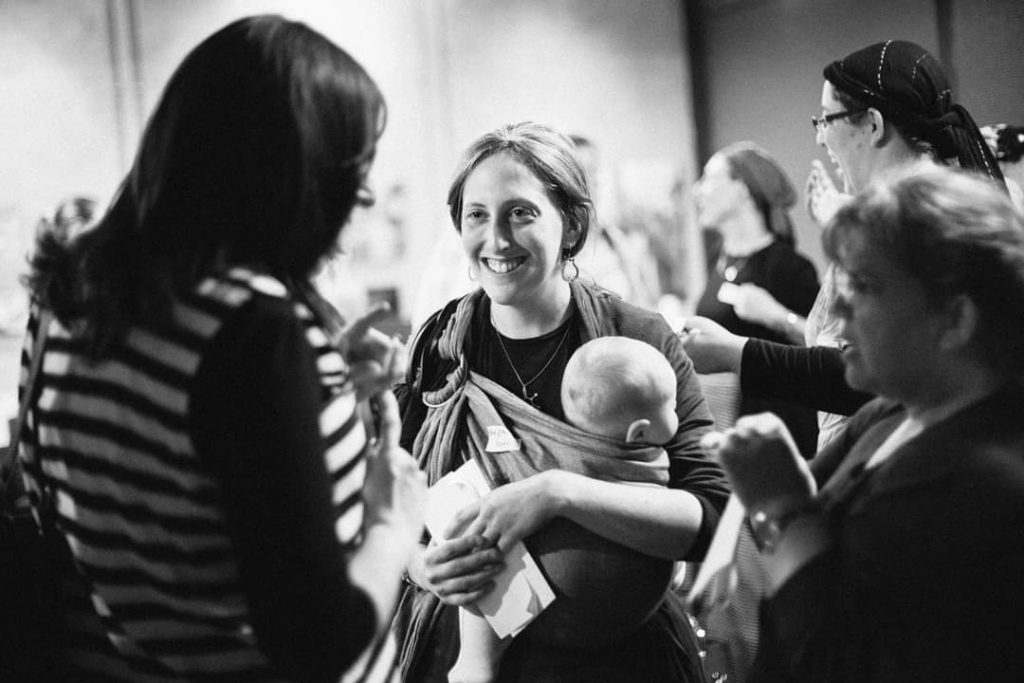
Related Articles
Related
From Silence to Success – An interview with Marni Woolf
From Silence to Success An interview with Marni Woolf By Penina Taylor A rising star on the Israeli acting scene, no one would guess that Marni Woolf (nee Schamroth) didn’t speak until she was five years old. Labeled as autistic and doomed to never be a fully...
A Not-So-Simple Truth – An Interview with Nina Tokayer
A Not-So-Simple Truth An interview with Nina Tokayer By Penina Taylor We all know that social media can be a powerful tool, especially for those looking to become celebrities. Influencers and “micro” influencers abound – trying to make their mark on the world and a...

